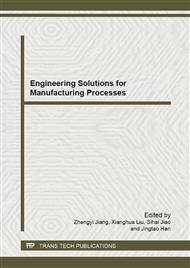p.1650
p.1656
p.1662
p.1666
p.1670
p.1675
p.1682
p.1687
p.1691
Research on Open Shop Scheduling Based on Genetic Algorithm
Abstract:
Open shop scheduling problem is a typical NP problem with wide engineering background. It is of importance with respect of theory and application. In this paper, a mixed integer programming model was established with the objective to minimize the makespan based on the characteristics of the open shop, and a evolution genetic algorithm(EGA) was proposed. The representation of chromosome used in this paper was composed of two layers: operation layer and machine layer, which can be encoded and decoded easily. In generating initial population, DS/LTRP heuristic was used in order to improve the quality of the population. And particular crossover operation was proposed, which generated multiple offspring at a time, so that the efficiency of the algorithm can be well improved. At last, the proposed algorithm was tested on taillard benchmark, and numerical example showed good result.
Info:
Periodical:
Pages:
1670-1674
Citation:
Online since:
January 2013
Authors:
Keywords:
Price:
Сopyright:
© 2013 Trans Tech Publications Ltd. All Rights Reserved
Share:
Citation:


